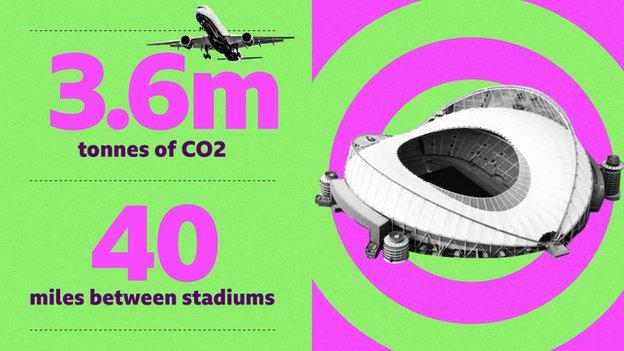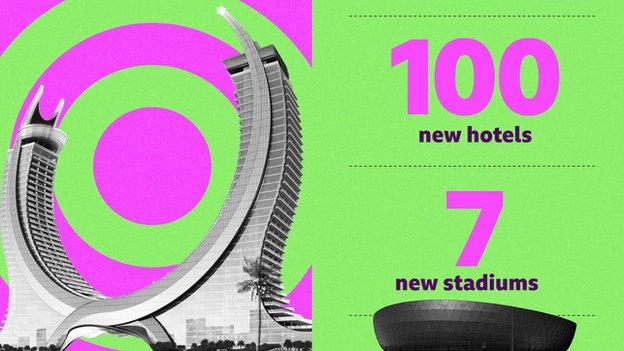[ad_1]

| Host nation: Qatar Dates: 20 November-18 December Coverage: Live on BBC TV, BBC iPlayer, BBC Radio 5 Live, BBC Radio Wales, BBC Radio Cymru, BBC Sounds and the BBC Sport website and app. Day-by-day TV listings – Full coverage details |
The World Cup in Qatar starts on Sunday in what promises to be a unique tournament – in both good and bad ways.
So what will make it so different?
More football each day

At 29 days from start to finish (20 November to 18 December), this will be the shortest World Cup since Argentina 1978.
That means organisers have to squeeze in four games most days during the group stages – at 10:00, 13:00, 16:00 and 19:00 GMT. Most World Cups in recent memory have had three a day.
There is also no turnaround time between the groups and the knockout stages, with the last 16 starting the day after the group stages end.
A condensed World Cup

There are only about 40 miles between the two furthest away stadiums – Al Bayt Stadium north of Doha to Al Janoub Stadium just south of the capital.
The drive takes just 50 minutes without traffic.
A tournament with a disposable stadium
Seven of the eight World Cup stadiums have been built from scratch for this tournament. Seven of the eight will have seats removed after the tournament… and Stadium 974, which is made of shipping containers, will be entirely disassembled.
Only one of the eight grounds will be the home stadium of a football team afterwards (Al Rayyan at the Ahmad Bin Ali Stadium).
In total about 200,000 seats will be removed from grounds (and, according to organisers, be gifted to developing countries) after the final.
A lack of places to stay
As a country that does not get near the top 100 in the world for population or size, it is perhaps no surprise that Qatar cannot offer the accommodation usually seen at a World Cup.
In March, the country had just 30,000 hotel rooms – with official figures suggesting 1.5 million people are coming.
They hope to have a total of 130,000 rooms available in the country in time for fans coming – including 9,000 beds in fans villages, big tents and metal cabins, 60,000 rooms in apartments and villas, 50,000 in hotels and 4,000 rooms in two cruise ships which will remain docked for the tournament.
The lack of rooms means some fans will have to stay in neighbouring countries such as Oman, Saudi Arabia and the United Arab Emirates and fly in for their games. Oman is offering free visas and 24 special flights a day from Muscat to Doha.
A lot of new infrastructure

Qatar has had to build a lot of infrastructure to host this tournament. As well as the stadiums, more than 100 hotels have popped up and there have been new roads and a metro built.
A new city is going to be built around the final stadium in Lusail. The budget for just stadiums and training facilities alone is £5.3bn.
Plenty of tickets sold
Despite all the issues with accommodation, 2.89 million tickets were sold at the last update in October – meaning this could be one of the best attended World Cups ever.
How much is a beer?
The price of a beer is about £10 to £15 in Qatar – although there are huge restrictions on where you can buy alcohol.
Usually, licensed hotel bars and restaurants are the only options in Qatar, although during the World Cup, fan zones and the grounds around the stadium will also sell beer.
The fan zones will reportedly charge £11.60 for 500ml of lager.
Drinking alcohol in public places (outside of these areas) can result in a prison sentence of up to six months and a fine of more than £700.
The tournament’s carbon footprint
Some 3.6 million tonnes of CO2 will be omitted during the tournament. It was 2.1 million in Russia.
Criticism over deaths of migrant workers
More than 6,500 migrant workers are thought to have died in Qatar from India, Pakistan, Nepal, Bangladesh and Sri Lanka alone from when the country was awarded the World Cup in 2010 to 2020, according to a Guardian investigation last year.
The Qatar government said the total was misleading, because not all the deaths recorded were of people working on World Cup-related projects.
Amnesty International says there are no exact figures because the Qatari authorities have failed to investigate the deaths of thousands of migrant workers over the past decade.




